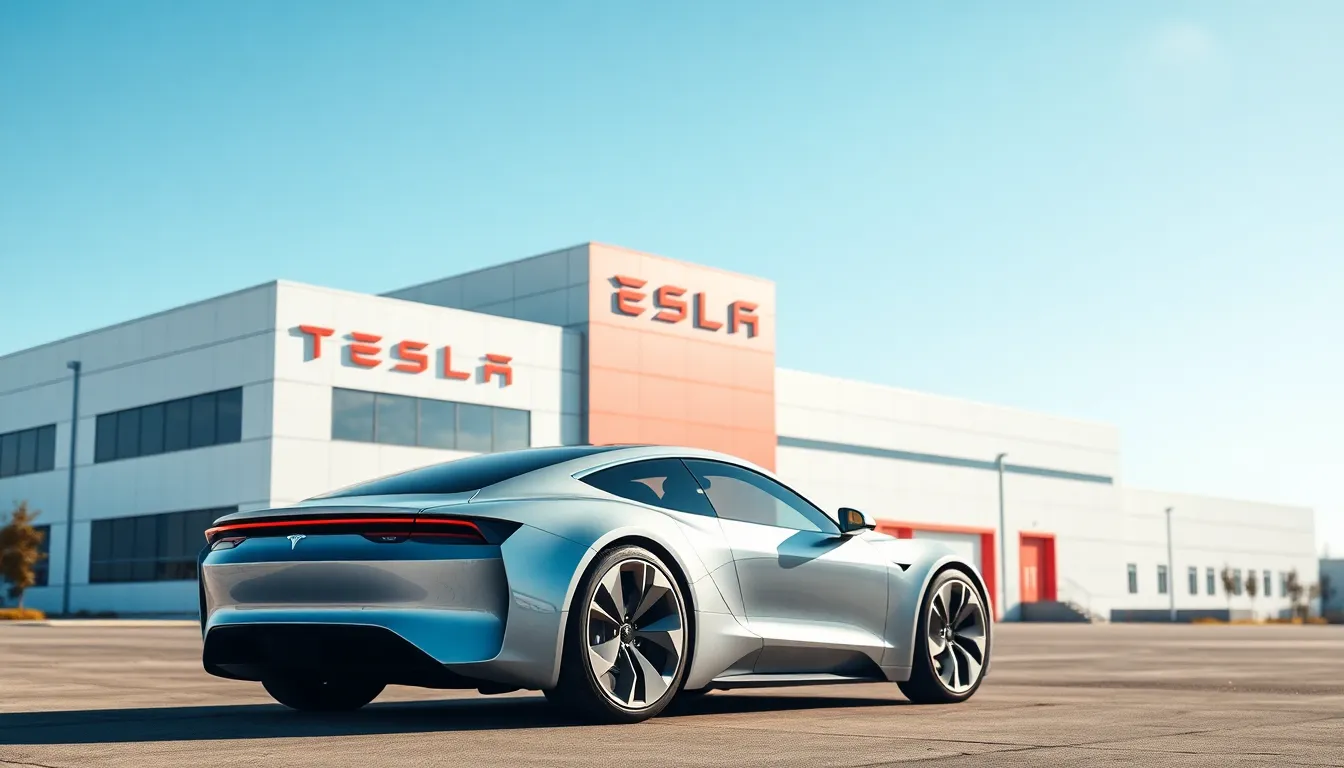Elon Musk, the man who’s made headlines as often as he’s made rockets, is back in the spotlight with his net worth hitting astronomical heights in March 2025. Just when you thought he couldn’t possibly get any richer, he’s proven that the sky’s not the limit—it’s just the beginning. With ventures spanning electric cars, space travel, and even brain-computer interfaces, Musk’s financial journey feels more like a rollercoaster ride than a traditional business saga.
As the world watches with bated breath, the question on everyone’s lips is: how much is he really worth now? Spoiler alert: it’s a number that could make even Scrooge McDuck green with envy. Buckle up as we dive into the fascinating world of Musk’s finances, exploring what makes his wealth soar and what it means for the future of innovation.
Table of Contents
ToggleOverview of Elon Musk’s Wealth
Elon Musk’s net worth reached approximately $240 billion in March 2025, securing his position among the world’s wealthiest individuals. His financial success stems from a diverse portfolio, which includes Tesla, SpaceX, Neuralink, and The Boring Company. Tesla’s market valuation significantly contributes to his wealth, reflecting a demand for electric vehicles and sustainable energy solutions.
SpaceX, notable for its advancements in space travel, also plays a crucial role in Musk’s financial growth. Launch contracts with NASA and various satellite companies enhance the company’s revenue streams. Revenue from the burgeoning space tourism sector is expected to add further financial gains.
Another significant element in Musk’s wealth comes from his innovation in brain-computer interfaces through Neuralink. This venture targets advancements in medical technology and artificial intelligence, further diversifying his financial assets. Strategic investments in various industries ensure a robust financial foundation.
Stock market fluctuations impact Musk’s wealth actively, with Tesla’s shares often driving notable changes in his net worth. As of March 2025, analysts predict continued growth for his financial standing due to ongoing projects and innovative solutions across different sectors. Regular updates on company performance demonstrate how closely tied his wealth is to market dynamics.
Investors and market watchers observe Musk’s every move, recognizing his influential role in technology and finance. Current trends indicate an ongoing interest in green energy initiatives, which position Musk favorably for future success. His wealth reflects not only achievements but also aspirations that shape various industries globally.
Sources of Elon Musk’s Income

Elon Musk’s financial empire stems from several key sources that significantly enhance his wealth. His ventures include groundbreaking companies that push technological boundaries.
Tesla
Tesla remains Musk’s most lucrative asset, contributing significantly to his wealth. The company, renowned for its electric vehicles, has seen its market valuation soar due to increasing global demand for sustainable energy solutions. In March 2025, Tesla’s market capitalization exceeded $1 trillion, reflecting strong sales and strategic expansion into energy products. Investors value Musk’s visionary leadership and the brand’s commitment to innovation, which continually drives stock prices. This enthusiastic investor sentiment directly impacts Musk’s net worth, making Tesla a cornerstone of his financial portfolio.
SpaceX
SpaceX plays a crucial role in Musk’s financial growth through its pioneering efforts in space travel. Launch contracts with NASA and an increasing number of commercial customers bolster its revenue. Demand for satellite launches and advancements in space tourism are also factors that elevate SpaceX’s financial standing. With a valuation surpassing $100 billion by March 2025, SpaceX’s success in reducing launch costs and its ambitious plans for Mars exploration attract significant investor interest. Musk’s leadership and vision for space technology continue to fuel expectations for the company’s profitability.
Other Ventures
Musk’s portfolio includes several other ventures that contribute to his financial success. Neuralink focuses on brain-computer interface technology, targeting enhancements in medical treatment and artificial intelligence. The Boring Company, which specializes in tunnel construction and infrastructure, also adds to his diverse income streams. Additionally, Musk invests in various technology startups and renewable energy projects, reinforcing his commitment to innovative solutions. Collectively, these ventures position him as a leading figure in multiple industries, showcasing his influence in shaping future advancements.
Factors Influencing Net Worth in March 2025
Several key elements play a vital role in shaping Elon Musk’s net worth as of March 2025.
Market Trends
Market trends significantly influence Musk’s wealth. Growing consumer interest in electric vehicles aligns with Tesla’s innovation. Monthly sales figures reveal strong demand, reflecting a broader shift toward sustainable energy solutions. Tesla’s market capitalization surpassing $1 trillion highlights this momentum. Investors increasingly favor companies committed to sustainability and technology. Emergence of new regulations supporting green initiatives further boosts Musk’s enterprises. Observations in the automotive sector indicate a shift toward electric vehicle adoption. This shift positions Tesla as a leader, assuring ongoing financial growth for Musk.
Investments and Acquisitions
Investments and acquisitions amplify Musk’s financial standing. Strategic investments across various sectors diversify his portfolio. Neuralink’s focus on medical technology indicates a forward-thinking approach to advancements. The Boring Company’s infrastructure projects promise to reshape urban transport, garnering interest from major cities. SpaceX’s partnerships with organizations like NASA enhance its value. Continued exploration of space tourism presents lucrative opportunities. Analysts note that these ventures attract significant venture capital, fueling future growth for Musk. Sustained investment in technology startups further aligns with emerging trends, reinforcing his commitment to innovation.
Comparison with Other Billionaires
Elon Musk’s net worth firmly positions him among the top-tier billionaires as of March 2025. Current rankings illuminate significant shifts within this elite group.
Trends in the Billionaire Rankings
The billionaire rankings exhibit notable fluctuations, influenced by market performance and economic conditions. Wealth accumulation increasingly reflects investments in technology and sustainability. Many billionaires, including Musk, demonstrate substantial gains due to rising stock values in innovative companies. Shifts in global markets frequently impact these rankings and Musk’s steadfast leadership continues to propel him forward. Insights reveal that while fortunes can fluctuate, Musk’s strategic decisions in electric vehicles and space exploration strengthen his standing.
Notable Competitors
Musk faces competition from other industry giants, particularly in tech and energy sectors. Bernard Arnault, the Louis Vuitton CEO, remains a formidable presence, with a net worth closely rivaling Musk’s. Jeff Bezos, founder of Amazon, also stays in close pursuit, with significant investments in various sectors. Warren Buffett, known for his investment acumen, continues to maintain a status as one of the wealthiest individuals as well. These competitors illustrate the dynamic and competitive landscape of billionaire rankings, reinforcing the significance of innovation and market adaptability for sustained success.
Future Projections
Elon Musk’s financial future looks promising, driven by strategic ventures and market trends. Analysts expect continued growth in his net worth, fueled by innovation and expansion.
Potential Growth Areas
Electric vehicle advancements represent a primary growth area for Musk. Tesla’s ongoing research into battery technology enhances vehicle performance and can significantly expand market share. SpaceX aims to capitalize on the booming space tourism sector, which is predicted to experience substantial growth in the coming years. Additionally, Neuralink’s potential breakthroughs in brain-computer interfaces could revolutionize healthcare, attracting substantial investments. The Boring Company targets urban infrastructure, focusing on sustainable transportation solutions, which aligns with rising green initiatives. Market analysts predict these sectors will continue to yield impressive returns, further boosting Musk’s financial portfolio.
Economic Factors
Economic conditions greatly influence Musk’s net worth trajectory. As consumer interest in electric vehicles rises, governments increasingly promote sustainable energy solutions. Regulations supporting green technologies enhance Tesla’s market position, resulting in higher sales figures. Inflation and global supply chain dynamics are pivotal factors affecting operational costs across Musk’s businesses. Additionally, investor sentiment and stock market performance can impact Tesla’s valuation directly. Analysts suggest that the intersection of these factors will play a critical role in shaping Musk’s financial outlook through March 2025 and beyond.
Elon Musk’s financial journey continues to captivate as he navigates the complexities of innovation and market dynamics. With a net worth of around $240 billion in March 2025, his ventures are not just reshaping industries but also setting new standards for wealth accumulation. The synergy between Tesla’s electric vehicle leadership and SpaceX’s advancements in space travel positions him at the forefront of technological evolution.
As consumer preferences shift towards sustainability and innovation, Musk’s diversified portfolio stands to benefit significantly. The ongoing developments in Neuralink and The Boring Company further solidify his impact on both healthcare and urban infrastructure. Looking ahead, the trajectory suggests a robust financial future for Musk, driven by his relentless pursuit of groundbreaking solutions and market adaptability.





